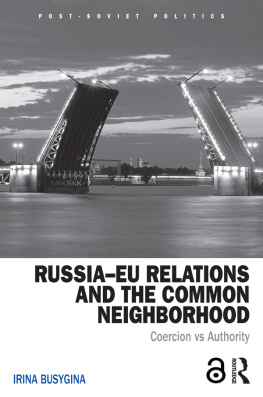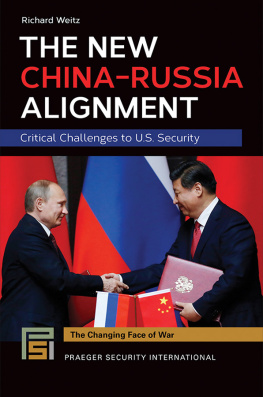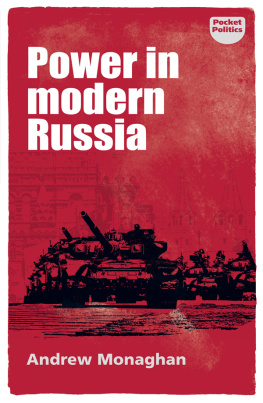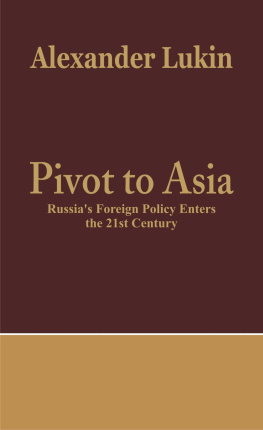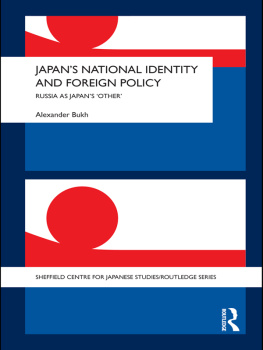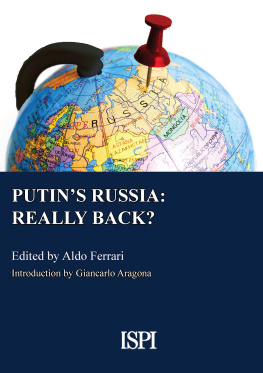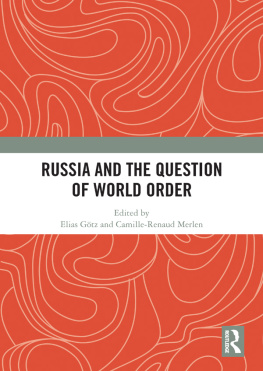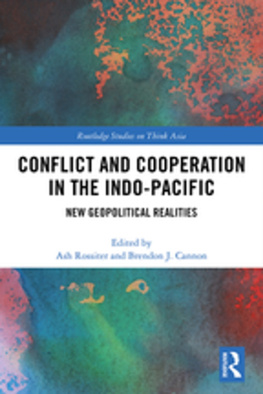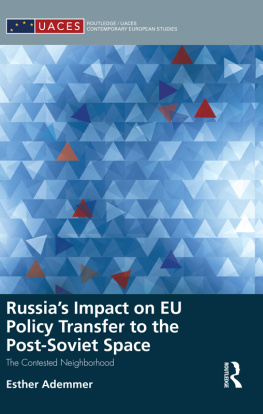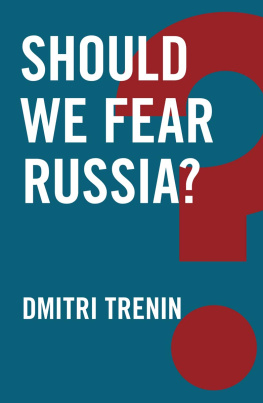RussiaEU Relations and the Common Neighborhood
Examining RussiaEU relations in terms of the forms and types of power tools they use, this book argues that the deteriorating relations between Russia and the EU lie in the deep differences in their preferences for the international status quo. These different approaches, combined with economic interdependence and geographic proximity, means both parties experience significant difficulties in shaping strategy and formulating agendas with regards to each other.
The Russian leadership is well aware of the EUs authority orientation but fails to reliably predict foreign policy at the EU level, whilst the EU realizes Russias coercive orientation in general, but cannot predict when and where coercive tools will be used next. Russia is gradually realizing the importance of authority, while the EU sees the necessity of coercion tools for coping with certain challenges. The learning process is ongoing but the basic distinction remains unchanged and so their approaches cannot be reconciled as long as both actors exist in their current form.
Using a theoretical framework and case studies including Belarus, Georgia and Ukraine, Busygina examines the possibilities and constraints that arise when the power of authority and the power of coercion interact with each other, and how this interaction affects third parties.
Irina Busygina is Professor of Politics at the National Research University Higher School of Economics in St. Petersburg. She was previously Professor of Comparative Politics at Moscow State Institute of International Relations (MGIMO) and European Studies Institute at MGIMO. She also heads the Centre for Regional Political Studies at MGIMO. Her main spheres of research include EURussia relations, regional development and regional policy in Russia and the EU (comparatively) and also federalism in the EU and Russia. Over the last several years she has conducted extensive researchboth individually and with co-authorsconnecting challenges of globalization for the Russian domestic and foreign policies with the need for political modernization. Her most recent book is Political Modernization of the State in Russia, published in 2012 by Liberal Mission Foundation (in Russian, with Mikhail Filippov).
Post-Soviet Politics
Series Editor: Neil Robinson
The last decade has seen rapid and fundamental change in the countries of the former Soviet Union. Although there has been considerable academic comment on these changes over the years, detailed empirical and theoretical research on the transformation of the post-Soviet space is only just beginning to appear as new paradigms are developed to explain change.
Post-Soviet Politics is a series focusing on the politics of change in the states of the former USSR. The series publishes original work that blends theoretical development with empirical research on post-Soviet politics. The series includes work that progresses comparative analysis of post-Soviet politics, as well as case study research on political change in individual post-Soviet states. The series features original research monographs, thematically strong edited collections and specialized texts.
Uniquely, this series brings together the complete spectrum of work on post-Soviet politics, providing a voice for academics worldwide.
Forthcoming
Euro-Atlantic Discourse in Georgia
The Making of Georgian Foreign and Domestic Policy After the Rose Revolution
Frederik Coene
Most recently published titles
Russian Foreign Policy in Eurasia
National Interests and Regional Integration
Lilia A. Arakelyan
RussiaEU Relations and the Common Neighborhood
Coercion vs. Authority
Irina Busygina
RussiaEU Relations and the Common Neighborhood
Coercion vs. Authority
Irina Busygina
First published 2018
by Routledge
2 Park Square, Milton Park, Abingdon, Oxon OX14 4RN
and by Routledge
711 Third Avenue, New York, NY 10017
Routledge is an imprint of the Taylor & Francis Group, an informa business
2018 Irina Busygina
The right of Irina Busygina to be identified as author of this work has been asserted by her in accordance with sections 77 and 78 of the Copyright, Designs and Patents Act 1988.
The Open Access version of this book, available at www.taylorfrancis.com, has been made available under a Creative Commons Attribution-Non Commercial-No Derivatives 4.0 license
Trademark notice: Product or corporate names may be trademarks or registered trademarks, and are used only for identification and explanation without intent to infringe.
British Library Cataloguing in Publication Data
A catalogue record for this book is available from the British Library
Library of Congress Cataloging in Publication Data
Names: Busygina, Irina, author.
Title: Russia-EU relations and the common neighborhood : coercion vs. authority / Irina Busygina.
Other titles: Russia-European Union relations and the common neighbourhood
Description: Abingdon, Oxon ; New York, NY : Routledge, 2017. |
Series: Post-Soviet politics | Includes bibliographical references and index.
Identifiers: LCCN 2017002130 | ISBN 9781138215467 (hardback) | ISBN 9781315443966 (e-book)
Subjects: LCSH: Russia (Federation)Foreign relations. | Russia (Federation)Foreign relationsEuropean Union countries. | European Union countriesForeign relationsRussia (Federation) | Russia (Federation)Foreign relationsFormer Soviet republics. | Former Soviet republicsForeign relationsRussia (Federation)
Classification: LCC DK510.764 .B88 2017 | DDC 341.242/20947dc23
LC record available at https://lccn.loc.gov/2017002130
ISBN: 9781138215467 (hbk)
ISBN: 9781315443966 (ebk)
Typeset in Times New Roman
by Out of House Publishing
To my parents, and to Sascha, Lisa, Sophia and Iliya
*****
The General and his troops march forth to battle,
The Sickling and the Timid stop at home,
The Rich Man purchases a costly dome.
The Proud Man falls, and Laughter mocks his fall,
The Crafty Man makes cats-paws of them all!
Friedrich Schiller, The Game of Life
This book by Irina Busygina offers a broad comparative analysis of controversial and less than consistent policies pursued by Moscow and Brussels towards the grey zone between them. Using the contraposition of coercion and authority, the author offers compelling conclusions about the roots and the dynamics of the current RussiaEU crisis. A balanced, highly readable volume which should be a reference book for policymakers and scholars on both sides of the European divide.
Andrey Kortunov, Director General of the Russian International Affairs Council (RIAC)
Irina Busygina is one of the most thoughtful Russian experts on EURussia relations. In her new book, she takes up the challenging task of sorting out the once promising, but by now woefully broken relationship. Irina, however, is looking beyond the current alienation. She urges both sides to learn from their failure in order to build more viable ties going forward.
Dmitri Trenin, Director of the Carnegie Moscow Center
In her new book, Irina Busygina offers an elegant, theoretically informed analysis of EURussia relations that is much needed for grasping the nature of the present confrontation. Looking at their interaction as well as their policies in the common neighbourhood from the perspective of different forms of power, Busygina sheds light on both similarities and differences in their strategies. Her insights are sobering: while coercion can work in the short-term, the EUs mode of existence is better suited to build more stable authority relations although this has proven to be complicated in the time of crisis.

